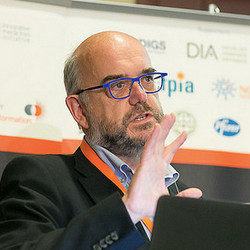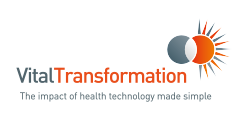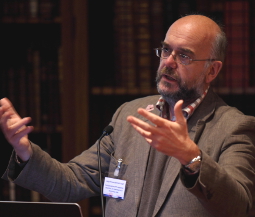Bart Vannieuwenhuyse is EMIF Coordinator and will be a speaker at the event “EMIF: E-managing the Future of Health Data” in Budapest, from 16th-17th March. The Conference is by-invitation only.

“When it comes to sharing health data, solving the technical solutions of data sharing is more straightforward than structuring workable collaboration models that satisfy both data owners and researchers alike,” says Bart Vannieuwenhuyse, Senior Director Health Information Sciences, Janssen Pharmaceutica; Coordinator EMIF.
by Alison Kilian
Harnessing electronic health records and real world evidence to advance medicines development and research holds huge potential for advancing healthcare – however a number of challenges remain when it comes to realising this potential. EMIF, the European Medical Information Framework, seeks to find solutions to some of these challenges.
A programme of the Initiative Medicines Initiative (IMI), one of EMIF’s primary objectives is to see how research can be advanced by reutilising already available data. “The overall objective is to make sure we develop both technical solutions, as well as governance solutions, in order to enable an eco-system in which both researchers and data owners – and of course the other relevant stakeholders – are comfortable,” explains EMIF Coordinator Bart Vannieuwenhuyse. Proving the value of collaboration to all participants is a central concern, he says. While technical challenges to data sharing of course exist, Vannieuwenhuyse sees these as being more straightforward.
“The real puzzle is to find the right model in which collaboration can happen to the satisfaction of everyone.” In Vannieuwenhuyse’s view, EMIF offers promise in finding such solutions, thanks to its broad approach and its diversity of participants.
From AD to Metabolics, and More – the EMIF Approach
The EMIF approach goes from data discovery, to data assessment, to data re-use. Starting with fairly high-level discovery of available data sets – meta data descriptions, which are then catalogued – the next step is to assess the suitability of the resulting databases, says Vannieuwenhuyse – i.e. “Does the database have the subjects I’m interested in? Is there a sufficiently large numbers of subjects?” Then, a way needs to found for researchers and data owners to collaborate on the analysis of this data. Finally, all of this be must done while safeguarding privacy, safety, legal and ethical concerns.
With two research projects running within the EMIF programme – EMIF-AD, which focuses on early onset and progression markers of Alzheimer’s Disease, and EMIF-Metabolics, which focuses on identifying risk markers for obesity to pinpoint co-morbidities – EMIF involves a broad and diverse range of participants. “We have a wide variety of people involved,” says Vannieuwenhuyse, “from data scientists to data owners, epidemiologists, and biologists looking at molecular pathways.” On top of that, there is also a wide variety of data types represented in the consortium, with data sources ranging from general practitioner networks, hospitals, and research cohorts, to biobanks, and more. “It’s a challenge because you need to find solutions that fit most of these data sets and users,” says Vannieuwenhuyse – adding, “it’s not always possible”.
Collaborating at Local and at European Level
As EMIF Coordinator, part of Vannieuwenhuyse’s role includes outreach and communications – talking about the project’s latest news, the opportunities, the solutions, the challenges, and the lessons learned. “It’s important to share these insights with diverse audiences,” he says: “Underlining the benefits of this IMI project for diverse parties helps to motivate collaboration towards a common goal.”
As part of its work towards greater collaboration and communication, the consortium will soon host the event “EMIF: E-managing the Future of Health Data” in Budapest, from 16th – 17th March. The event will explore how we can maximise the benefits offered by harnessing available health data, while solving issues around its reuse and working with regulators to provide the right evidence. “We are really trying to offer a forum in which EMIF researchers, as well as local researchers, data owners and other interested parties in the central and eastern European region can exchange views,” says Vannieuwenhuyse. Holding the conference in Budapest allows EMIF to reach further and to engage other European participants than it might normally come into contact with. The panelists of the “E-managing the Future of Health Data” symposium reflect this call for diversity and will offer geographically varied views on the real world data questions to be discussed (full agenda here). “Maximising understanding of real world evidence and its reuse is an opportunity to make healthcare better for all patients, for all of us,” says Vannieuwenhuyse. “Regional diversity is important.”
Bart Vannieuwenhuyse is EMIF Coordinator and will be a speaker at the event “EMIF: E-managing the Future of Health Data” in Budapest, from 16th-17th March. The Conference is by-invitation only.



